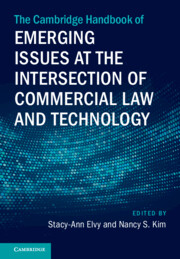Book contents
- The Cambridge Handbook of Emerging Issues at the Intersection of Commercial Law and Technology
- The Cambridge Handbook of Emerging Issues at the Intersection of Commercial Law and Technology
- Copyright page
- Epigraph
- Contents
- Figures
- Tables
- Contributors
- Preface
- Acknowledgments
- Part I Contemporary Technological Developments
- 1 Non-fungible Tokens in Commercial Transactions
- 2 The Challenges of Technological Property
- 3 Regulation under the EU Artificial Intelligence Act
- 4 Blockchain and the Uniform Commercial Code
- 5 Can Technology Foster Price Transparency in Credit Card Processing Markets?
- 6 Quantum Privacy
- 7 Give It Back
- Part II The Implications of Emerging Product Design and Business Models
- Part III Contracting and Dispute Resolution
- Index
5 - Can Technology Foster Price Transparency in Credit Card Processing Markets?
from Part I - Contemporary Technological Developments
Published online by Cambridge University Press: 08 February 2025
- The Cambridge Handbook of Emerging Issues at the Intersection of Commercial Law and Technology
- The Cambridge Handbook of Emerging Issues at the Intersection of Commercial Law and Technology
- Copyright page
- Epigraph
- Contents
- Figures
- Tables
- Contributors
- Preface
- Acknowledgments
- Part I Contemporary Technological Developments
- 1 Non-fungible Tokens in Commercial Transactions
- 2 The Challenges of Technological Property
- 3 Regulation under the EU Artificial Intelligence Act
- 4 Blockchain and the Uniform Commercial Code
- 5 Can Technology Foster Price Transparency in Credit Card Processing Markets?
- 6 Quantum Privacy
- 7 Give It Back
- Part II The Implications of Emerging Product Design and Business Models
- Part III Contracting and Dispute Resolution
- Index
Summary
Credit card processing relies deeply on technology, so it is no surprise that technological forces are responsible for some of the problems with opaque pricing in this market. Technology made modern credit card processing possible by speeding up the transactions and making transactions less expensive. But this same technology made pricing harder for merchants to understand and compare among different credit card processors. Academic scholarship has failed to address nontransparent pricing for merchant card processing, and laws in various countries are focused on interchange fees, not merchant fees. This chapter argues that legal academics should study credit card processing fees and that regulators should use Canadian laws as an example of how to foster transparency.
- Type
- Chapter
- Information
- The Cambridge Handbook of Emerging Issues at the Intersection of Commercial Law and Technology , pp. 107 - 127Publisher: Cambridge University PressPrint publication year: 2025

